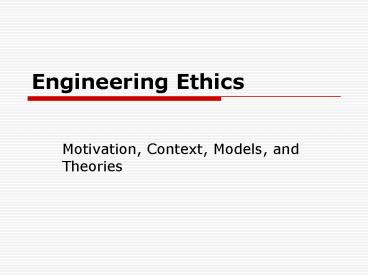Engineering Ethics - PowerPoint PPT Presentation
1 / 19
Title:
Engineering Ethics
Description:
Following the requirements of the law provides ... Utilitarianism. Duty Ethics. Rights Ethics. Virtue Ethics ... Utilitarianism John Stuart Mill (1806-1873) ... – PowerPoint PPT presentation
Number of Views:25
Avg rating:3.0/5.0
Title: Engineering Ethics
1
Engineering Ethics
- Motivation, Context, Models, and Theories
2
Ethics and the Law
- Following the requirements of the law provides
protection from prosecution - Since engineering work utilizes new technology
before experience and laws can catch up, ethics
seeks to go beyond the dictates of current law - Ethical behavior provides protection from civil
suits, from damage to reputation, or from loss of
professional licensure and encompasses ways
engineers should conduct themselves in their
practice
3
Ethics and Accreditation 1
- TAC outcome i. An engineering technology program
must demonstrate that graduates have an ability
to understand professional, ethical and social
responsibilities - EAC outcome f. Engineering programs must
demonstrate that their students attain an
understanding of professional and ethical
responsibility
4
Ethics and Accreditation 2
- CAC outcome e. The program enables students to
achieve an understanding of professional,
ethical, and social responsibilities - ASAC outcome f. Applied science programs must
demonstrate that graduates have an understanding
of professional and ethical responsibility
5
Ethics and Registration
- To become a registered professional engineer in
Indiana, part of the examination may be designed
to test the applicant's knowledge and
understanding of the ethical, economic, and legal
principles relating to the practices of
professional engineering. - The take-home part III of the principles
practice examination requires a score of 88 and
generally covers ethics and Rule 11 - Rules of
Professional Conduct
6
Ethics and Technical Societies
- Each technical society for the various
engineering disciplines requires a member to
subscribe to the code of ethics of the society. - Each society publishes its own code of ethics
which are particularly useful to guide members
when the only options are unsatisfactory e.g.
ASCE, ASME, IEEE, NSPE, IIE, SME, AIChE
7
Three Ethical Models
- Malpractice, or Minimalist, Model
- Reasonable-Care, or Due-Care, Model
- Good Works Model
8
Malpractice, or Minimalist, Model
- This is a minimalist model in which the
professional is concerned only with meeting
standards and requirements of the profession and
any other laws or codes that apply. This model
looks to find fault when problems or accidents
arise from someone's failure to meet a
requirement.
9
Reasonable-Care, or Due-Care, Model
- A model of engineering practice in which the
engineer is expected to take reasonable
precautions or care in the practice of his
profession. The model strives to prevent harm,
and it appeals to a "standard of reasonableness
as seen by a normal, prudent nonprofessional."
10
Good Works Model
- A model of engineering practice in which
engineers go beyond the basics of what is
required by standards and codes and do what they
"ought" to do to improve product safety, social
health or social well-being.
11
Ethical Theories Based on Philosophical
Scholarship
- Utilitarianism
- Duty Ethics
- Rights Ethics
- Virtue Ethics
- See Fleddermann, Engineering Ethics, pp 33-38
12
Utilitarianism John Stuart Mill (1806-1873)
- Considers a balance of good bad consequences
for everyone affected (society) - Actions are good that serve to promote human
well-being - Cost-Benefit analysis is an application
- Consideration of most benefit to the most people
outweighs needs of a few individuals
13
Duty Ethics Immanuel Kant (1724-1804)
- There are duties that should be performed (e.g..
Duty to treat others fairly or not to injure
others) regardless of whether these acts do the
most good or not.
14
Rights Ethics John Locke (1632-1704)
- People have fundamental rights (like life,
liberty, property) that others have a duty to
respect.
15
Virtue Ethics
- Actions are considered right if they support good
character traits (virtues) and wrong if they
support bad character traits (vices) - Closely tied to personal honor
16
Codes of Ethics Commonly Hold
- Engineers and technologists have a duty to hold
the heath and safety of the public as a primary
concern. Usually the first cannon of any code. - Other duties are summarized in order of
importance with most important first e.g. Safety
is more important than conflict of interest.
17
ASME Ethics Code
- 1. Engineers shall hold paramount the safety,
health and welfare of the public in the
performance of their professional duties. - 2. Engineers shall perform services only in the
areas of their competence. - 3. Engineers shall continue their professional
development throughout their careers and shall
provide opportunities for the professional and
ethical development of those engineers under
their supervision. - 4. Engineers shall act in professional matters
for each employer or client as faithful agents or
trustees, and shall avoid conflicts of interest
or the appearance of conflicts of interest.
18
ASME Ethics Code
- 5. Engineers shall build their professional
reputation on the merit of their services and
shall not compete unfairly with others. - 6. Engineers shall associate only with reputable
persons or organizations. - 7. Engineers shall issue public statements only
in an objective and truthful manner. - 8. Engineers shall consider environmental impact
in the performance of their professional duties. - 9. Engineers shall consider sustainable
development in the performance of their
professional duties.
19
References
- Fleddermann, Charles B, Engineering Ethics, 2nd
Ed., 2004, Pearson Prentice Hall, Upper Saddle
River, NJ, Chapter 3. - ASME PPC, Ethics, referenced from
http//www.professionalpractice.asme.org/engineeri
ng/ethics/index.htm - NSPE Code (detailed) referenced from
http//www.nspe.org/ethics/eh1-code.asp,
True-False quiz referenced from
http//www.nspe.org/ethics/eh1-test.asp































